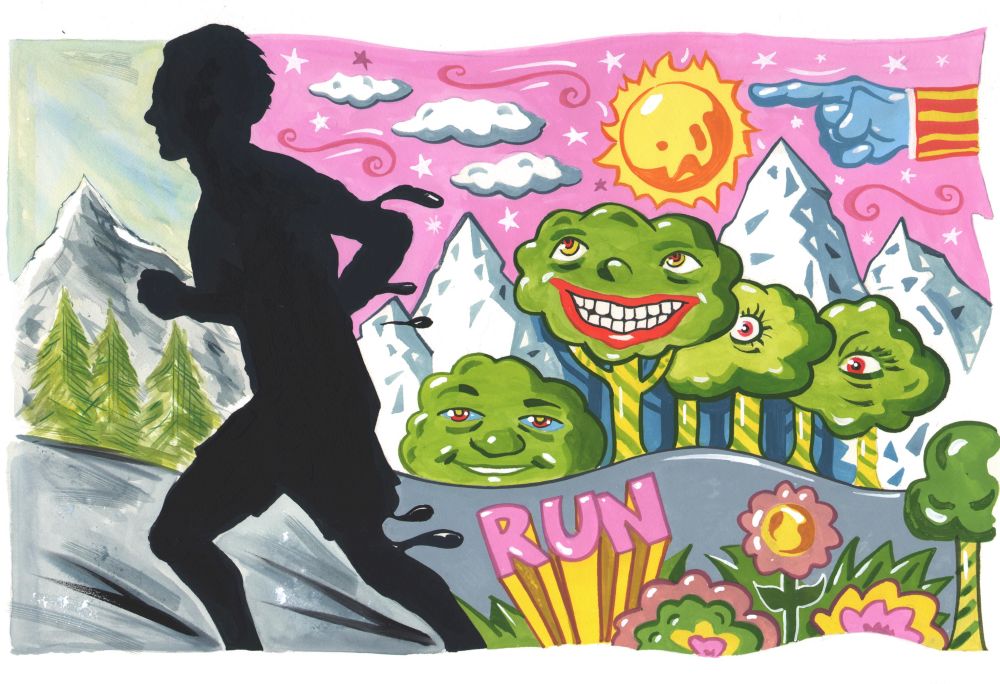Another kind of runner’s high
The secret is out: many runners have been using cannabis to get through the pain and monotony of an ultramarathon. But is weed a performance-enhancing drug?


By Mary Luz Mejia
Ninety-eight per cent of fighters in the UFC admit to using. Many ultramarathoners, endurance runners and triathletes use it, too. And increasingly, so are weekend warriors and amateur athletes. Cannabis, consumed as a vapour, an edible or in postworkout muscle balms, is starting to gain traction across North America and beyond. Why now?
The 420 Games, a series of races, challenges and events being held throughout North America, were started by amateur athlete and cannabis user Jim McAlpine, who says marijuana use is coming out of the haze primarily because of its legality. “I believe many athletes have used cannabis for years,” he says, “but are now finally feeling able to talk about it. Me included.”
RELATED: The 420 Games gives “runner’s high” a new meaning
The 420 Games symbol is a pot leaf coupled with a “≠,” followed by the word stoner. “I strongly believe that cannabis and the people that use it have a stigma attached to it, one they do not deserve,” McAlpine explains. On his website’s blog, he’s quoted as saying, “We are the Michael Phelpses of the world.”
In the ultramarathon world, pro runner Avery Collins is that sport’s up-and-coming Phelps. In 2014, his first pro year, he won five ultras. Collins says he consumes 10–20 mg in the morning after a cup of coffee, and another two or three doses during the day. “I found that a lot of people think that I’m using for performance enhancement but I don’t think it enhances performance at all,” he claims. “On the treadmill or during long runs, it takes away the monotony. The miles seem to go by a little quicker,” he says.
Miles go by quicker because, according to New York City’s Dr. Scott Weiss, any time an athlete ingests cannabis, “their attention gets divided. This psychological divide can get their mind off cycling, running or swimming for longer periods of time, so that their attention can be split.” He and Dr. Mike Hart, a London, Ont.-based member of
the Practitioners for Medicinal Marijuana (a network of specialists committed to cannabis patient care), both point to a growing body of scientific evidence regarding the beneficial, medicinal uses of weed.
The biggest area of scientific interest is the cannabinoid (also known as CBD) interactions with the body – and how this can help mitigate pain, inflammation, nausea, fatigue, anxiety, sleeplessness and other conditions. Dr. Weiss says that people mistakenly lumped cbd with THC – the chemical in marijuana that makes you high. Research has shown that we have cannabinoid receptors in the brain, spinal cord and in our nerves that receive this and, in fact, also produce the chemical on its own. What of that runners high credited to endorphins? Dr. Weiss says that’s the cannabinoid factor because “we know that endorphins are too big to cross the blood-brain barrier.”
Back on the trail, Collins, who can run 100 miles a week, says he uses a CBD-based balm to soothe his overworked muscles, and thc to help him have what he calls a “deeper, more restful sleep.”
Collins lives in Colorado, where cannabis is now legal. Here in Canada, Dr. Hart says there are two ways to get it: legally, through a prescription from your physician that allows you to access the cannabis from a Health Canada-licensed producer, or illegally, off the street. The former is preferable for obvious reasons, says Dr. Hart, but also so that you can select the cbd strength and cannabis strain you need to get the results you want.
Does Dr. Hart believe athletes should be able to use cannabis while competing? Yes, he says, so long as it’s done in a safe and controlled manner (part of which includes limiting the levels of CBD and THC). “It’s not like an anabolic steroid where it makes you stronger or faster. Cannabis treats pain or gives you a cognitive boost. It shouldn’t It shouldn’t be a banned substance,” he affirms, adding that as long as you’re 25 years or older (for THC access) and 19 years or older (for CBD), you should be able to access it if you need it, particularly with the assessment of a doctor.


